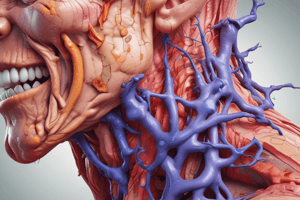Podcast
Questions and Answers
What is an effect of chronic stress on immune responses in healthy adults?
What is an effect of chronic stress on immune responses in healthy adults?
- Reduces the incidence of diseases
- Increases overall immune efficiency
- Inhibits immune responses (correct)
- Enhances adaptive immune responses
Which body system does NOT experience muscle and joint pain due to stress?
Which body system does NOT experience muscle and joint pain due to stress?
- Skeletal system
- Digestive system (correct)
- Muscular system
- Nervous system
How does short-term stress affect the immune system in healthy individuals?
How does short-term stress affect the immune system in healthy individuals?
- It significantly increases the incidence of diseases.
- It enhances innate immune responses. (correct)
- It has no impact on the immune system.
- It decreases the production of antibodies.
Which physiological effect is NOT typically associated with stress?
Which physiological effect is NOT typically associated with stress?
What reproductive issue can stress induce in males?
What reproductive issue can stress induce in males?
Which aspect of health is most likely affected by stress according to the context given?
Which aspect of health is most likely affected by stress according to the context given?
In older individuals, how does short-term stress impact them compared to healthy younger adults?
In older individuals, how does short-term stress impact them compared to healthy younger adults?
What digestive issue is linked with stress?
What digestive issue is linked with stress?
Which of the following is NOT a common symptom of stress?
Which of the following is NOT a common symptom of stress?
How does stress affect the menstrual cycle in females?
How does stress affect the menstrual cycle in females?
Flashcards are hidden until you start studying
Study Notes
Antibody Structure and Classes
- Antibodies typically consist of a four-chain structure, with IgG2 represented as a three-dimensional model.
- Five classes of antibodies exist, with IgM and IgD serving as antigen receptors for naïve B cells.
- Mature B cells express both IgM and IgD, but only IgM is secreted and has additional functions.
- IgM is the largest antibody, comprising five four-chain structures, and has 10 binding sites; it is crucial in early primary responses and complements activation.
- Class switching occurs in mature B cells, allowing them to change antibody class (IgG, IgA, IgE) while retaining specificity for the original antigen.
Primary and Secondary Antibody Responses
- The primary response to an antigen is characterized by a delay of several days due to B cell activation and differentiation.
- Secondary responses are faster and produce more antibodies, leading to quicker pathogen clearance, typically without symptoms.
Active vs. Passive Immunity
- Active immunity develops through an individual’s immune response to a pathogen, either naturally through infection or artificially through vaccination.
- Vaccines stimulate immunological memory without causing severe illness, significantly impacting public health by controlling diseases like smallpox and polio.
- Passive immunity results from transferring antibodies from one individual to another, such as maternal IgG to the fetus during pregnancy or IgA through breastfeeding.
- Artificial passive immunity is achieved through immunoglobulin injections, providing immediate, temporary protection.
T Cell-Dependent and T Cell-Independent Antigens
- T cell-dependent antigens require collaboration between B and T cells, involving antigen recognition and cytokine signaling for B cell activation.
- T cell-independent antigens can activate B cells directly through crosslinking of surface antibodies, typically found on bacterial surfaces.
Immune Response Against Pathogens
- The immune response aims to eliminate pathogens, with primary infections leading to a race between pathogen proliferation and immune system activation.
- Seroconversion indicates the relationship between antibody levels and pathogen load in the serum, often used for diagnosing diseases like HIV.
Mucosal Immune Response
- Mucosal tissues serve as barriers against pathogens, with IgA in secretions neutralizing threats.
- Specialized cells (M cells) in mucosal tissues sample antigens, facilitating immune response initiation.
Defenses Against Specific Pathogens
- Bacterial infections trigger diverse immune mechanisms, as certain bacteria can evade macrophage destruction; intimate interactions between infected macrophages and Th1 cells are crucial.
- Fungal infections exploit compromised immune systems, with similar defense mechanisms as those against bacteria employed by the immune system.
- Helminths (worm parasites) evoke an IgE-mediated response, involving eosinophils and mast cells to expel parasites from the body.
- Viral infections are primarily combated by NK cells, interferons, and cytotoxic T cells, with antibodies neutralizing viruses before cell entry.
Important Observations
- Both hygiene and exposure to pathogens play critical roles in developing immunity and possibly influencing the rising incidence of allergies.
- Immunological memory is essential in providing long-term protection, but passive immunity lacks the capacity to develop lasting memory.### Evasion of the Immune System by Pathogens
- Pathogens evolve strategies to evade the immune response, leading to chronic diseases such as tuberculosis caused by Mycobacterium tuberculosis.
- Staphylococcus aureus exists in various strains; methicillin-resistant strains (MRSA) are resistant to multiple antibiotics, complicating treatment.
- Viral mutations, like those in the influenza virus, necessitate annual vaccine updates due to changing antigens.
- Genetic recombination can occur when different influenza viruses infect the same cell, leading to new strains, exemplified by the H1N1 outbreak in 2010.
- Some pathogens produce immunosuppressive molecules, compromising the immune system subtly, especially prominent in various viruses.
Immunodeficiencies
- Immunodeficiencies arise from disruptions in complex immune pathways, categorized into inherited and acquired forms.
- Severe combined immunodeficiency disease (SCID) is a critical inherited condition affecting both B and T cell responses, often fatal without bone marrow transplants.
- Gene therapy approaches for SCID are being explored as alternatives to traditional transplants, which require tissue matching.
- HIV specifically targets and destroys CD4+ T-helper cells, leading to AIDS and rendering the immune response vulnerable to opportunistic infections.
- HIV is transmitted primarily through bodily fluids, and the seroconversion process is vital for diagnosing HIV infection.
Hypersensitivity Responses
- Hypersensitivity refers to excessive immune responses, with four types classified based on the mechanisms involved.
- Type I hypersensitivity (immediate) is mediated by IgE antibodies and can result in allergic reactions and anaphylactic shock; emergency epinephrine is life-saving.
- Type II (cytotoxic) and Type III (immune complex) hypersensitivities involve antibody-mediated tissue damage, seen in conditions like transfusion reactions or systemic lupus erythematosus.
- Type IV hypersensitivity (delayed) is a cellular immune response, with sensitized T cells responding to previously encountered antigens, exemplified by the tuberculin skin test.
Autoimmune Responses
- Autoimmune diseases occur when the immune system mistakes self-antigens for foreign ones, resulting in tissue damage.
- Factors like genetic predisposition and environmental triggers (e.g., infections) can disrupt immune tolerance.
- Common autoimmune diseases include rheumatoid arthritis and lupus, which significantly damage tissues and organs.
- Treatments typically involve immunosuppressive and anti-inflammatory medications like steroids.
Transplantation and Cancer Immunology
- Blood typing is crucial for safe transfusions, pinpointing ABO and Rh factors to prevent hemolytic disease in newborns.
- Tissue typing precedes organ transplantation to reduce transplant rejection, necessitating compatibility of MHC molecules.
- The immune system can target and control some cancers, but resistance mechanisms can complicate therapies.
- Cancer vaccines aim to enhance the immune response against tumor cells, representing an evolving area of cancer treatment.### MHC Polygeny and Polymorphism
- MHC polygeny involves multiple MHC proteins on cells; MHC polymorphism refers to numerous alleles for each MHC locus.
- The human population exhibits a wide variety of MHC alleles, leading to extensive genetic diversity.
- Differences in MHC molecules between organ donors and recipients can trigger cytotoxic T cell responses, often resulting in organ rejection.
Organ Transplantation and Immune Response
- Massive infiltration of T lymphocytes in biopsy tissues shortly after transplantation indicates a high risk of transplant failure.
- The response of the immune system in this context causes harm and is analogous to a primary T cell immune response.
- Successful organ transplants require matching MHC molecules; ideally, 3–4 matches are necessary to increase the likelihood of success.
- Family members have a higher chance of sharing MHC molecules due to genetic similarities, unlike unrelated individuals.
Challenges in Transplantation
- A global database aids in finding unrelated organ donors, but the supply is insufficient for all patients in need.
- Graft-versus-host disease can occur in bone marrow transplants, wherein donor lymphocytes attack recipient tissues.
- Symptoms of graft-versus-host disease include rash and liver damage; efforts are made to mitigate this by removing mature T cells from donor marrow.
Immune Responses Against Cancer
- A robust immune system can control certain cancers, such as Kaposi's sarcoma, which rarely affects immunocompetent individuals.
- Viral infections, like hepatitis B and human papillomavirus, are linked to increased cancer risk; vaccines exist to prevent these cancers.
- The immune response to cancer typically progresses through three stages: elimination, equilibrium, and escape, with many cancers mutating to evade detection.
Cancer Vaccines and Immune Enhancement
- Cancer vaccines aim to enhance the body’s immune response against cancer cells, differing from traditional vaccines.
- They involve injecting treated cancer cells to provoke stronger immune responses and have shown promise in clinical trials for melanoma and renal cell carcinoma.
The Role of the Immune System
- While the immune system has challenges, its overall benefits significantly outweigh the drawbacks.
- It maintains health by combating pathogens effectively; failures often highlight the system's necessity.
Stress and Immune Response
- The immune system interacts intricately with the nervous and endocrine systems, a study area known as psychoneuroimmunology.
- Stress influences immune health, with cortisol and synthetic drugs like prednisone known to suppress T cell responses.
- Short-term stress may enhance innate immune responses, though chronic stress has adverse effects, potentially inhibiting immunity even in healthy individuals.
Effects of Stress on Body Systems
- Stress can impact various organ systems, leading to conditions like acne, anxiety, muscle pain, and weakened immune responses.
- Older adults and those with weakened immune systems are more susceptible to illness due to stress, highlighting the importance of managing stress for overall health.
Studying That Suits You
Use AI to generate personalized quizzes and flashcards to suit your learning preferences.




